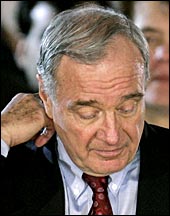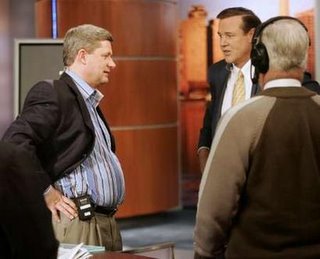Lifting the Deep Malaise
So the Liberals may survive the sponsorship scandal. But the affair points to a deeper malaise in Canada's politics. It is worrying that the Conservatives are considered unable to win even when the Liberals are laid low by scandal. Long periods of domination by a single party are not good for the health of any democracy, let alone one in which power at the national level is highly centralised.
-The Economist, December 1st, 2005
Today, Canadians clearly are ready for change. If not now -- if not after a painfully incoherent minority Liberal government, if not after a succession of scandals, if not after four full terms of deteriorating government -- then when? When is change acceptable if not now?
-The Globe and Mail, January 14th, 2006
 Despite expectations at the beginning of this campaign, we are now one step closer to restoring competitive democracy in Canada - one step closer to curing the deep malaise in Canadian politics. 12 years of Liberal rule came to an end yesterday with the election of a Conservative minority government (Seat count: CON - 124, LIB - 103, BQ - 51, NDP - 29, IND - 1). Voter turnout was relatively high, 65%, reversing a trend of steady decline since 1988. The message to politicians was loud and clear: corruption will not be tolerated by the electorate.
Despite expectations at the beginning of this campaign, we are now one step closer to restoring competitive democracy in Canada - one step closer to curing the deep malaise in Canadian politics. 12 years of Liberal rule came to an end yesterday with the election of a Conservative minority government (Seat count: CON - 124, LIB - 103, BQ - 51, NDP - 29, IND - 1). Voter turnout was relatively high, 65%, reversing a trend of steady decline since 1988. The message to politicians was loud and clear: corruption will not be tolerated by the electorate.The election result was not only good news for Canadian democracy, but for Canadian federalism as well. Despite being shut out entirely from the province of Quebec in the 2004 election, the Conservatives were able to pick up 10 seats with 24.6% of the popular vote. Indeed, the surge in Conservative support in Quebec was one of the biggest surprises of the campaign. Had the Conservatives formed government without electing a single MP from la belle province, federalism would have been in a precarious position. The same precariousness would have held true had the Liberals again formed the government, further imprinting in the minds of Quebecers that federalism and corrupt government are concepts one and the same. But yesterday's results turned out to be a blow to the sovereigntist movement. Paul Martin's huge blunder in declaring the election to be a "referendum election" thankfully did not backfire as Giles Dusceppe failed to win his long-desired aim of 50% plus one of the popular vote. The BQ's support dropped to 42.1% and they managed to win only 51 seats, less than the 54 they won last time, despite wide expectations (mine included) that their seat count would increase. Meanwhile, at the other end of the country, where increased political representation has not followed from growing economic clout, a newly elected Prime Minister from Calgary was able to say, "The West has wanted in. The West is in now."
 Yet another welcome development in yesterday's frantic politicking came from the outgoing Prime Minister, Paul Martin. As Finance Minister in Jean Chretien's government, Martin was able to slay the deficit, but his short reign as Prime Minister has been an incoherent and unscrupulous disaster. Somehow, the Liberals managed to avoid complete decimation at the polls, escaping with 103 seats, even after running one of the most horrendous campaigns in Canadian history. It was difficult for me to watch Paul Martin spew his invective on the campaign trail over the last few weeks. It made me feel both nausea (from the vile rhetoric) and pity (from watching a once-proud man's self-immolation). But yesterday Paul Martin did the right and honourable thing. He recognized that the time has come for the Liberal Party to build itself anew. In his concession speech, he announced that he will continue to serve the constituents of Lasalle-Emard, but will be stepping aside as leader of the Liberal Party.
Yet another welcome development in yesterday's frantic politicking came from the outgoing Prime Minister, Paul Martin. As Finance Minister in Jean Chretien's government, Martin was able to slay the deficit, but his short reign as Prime Minister has been an incoherent and unscrupulous disaster. Somehow, the Liberals managed to avoid complete decimation at the polls, escaping with 103 seats, even after running one of the most horrendous campaigns in Canadian history. It was difficult for me to watch Paul Martin spew his invective on the campaign trail over the last few weeks. It made me feel both nausea (from the vile rhetoric) and pity (from watching a once-proud man's self-immolation). But yesterday Paul Martin did the right and honourable thing. He recognized that the time has come for the Liberal Party to build itself anew. In his concession speech, he announced that he will continue to serve the constituents of Lasalle-Emard, but will be stepping aside as leader of the Liberal Party.For the Liberal Party, the road ahead will require a lot of hard work. The situation they face now is similar to (though arguably less dire than) the one faced by the divided right-of-center parties who spent more than a decade wandering the political wilderness before the "unite the right" movement's culmination in yesterday's Conservative win. The warring factions of the Liberal Party will have to find a way to unite and regain the public's trust. To that end, there are several challenges ahead.
The most immediate problem facing the Liberal Party is that they are broke. According the Elections Canada, the last annual filing of the Liberal Party showed that they had accumulated $34,818,257.32 in debt. The next challenge will be to find a new leader. A swift anointment of Frank McKenna, currently serving as Canadian ambassador to the United States, will probably not do the trick. The Liberals need to hold a leadership race that will involve a serious debate about the direction of party. Finally, they will need to hold a policy convention with grassroots involvement in order to flesh out a Liberal vision for the country.
The Conservatives, for their part, now have a tremendous opportunity. The minority won by the Conservatives -- to judge by the numbers -- is a very delicate one, and appears to be even less stable than the last parliament. But there are several key differences that suggest that this parliament will be able to last at least 18 or 24 months. First of all, in the last parliament, both the Conservatives and the Bloc were itching to get to the polls to take advantage of the Gomery commission. This time, the Liberals will be busy getting their party's house in order and raising cash, and the Bloc will be wary of the Conservative beachhead in Quebec while there is no huge scandal to stem the tide. Second, if there is anyone who has a good chance of taming the three-ringed circus that will emerge in the next parliament, it is Stephen Harper. In his career, he managed to unite a squabbling Canadian Alliance party, he brokered a merger between the Alliance and the Progressive Conservatives, and, in this election campaign, he managed to steer a newly reunited party of ragtag misfits into the political center. I was not convinced of this before the campaign began, but Harper has shown that he can be a pragmatic and competent leader. It is now up to him to prove that this is the case if he hopes to earn a stronger mandate in the next election.
 Harper's first order of business will be to dismantle the Liberal patronage machine that has been in operation for much of the last century. For reasons that I cannot understand, when Harper commented that regardless of who won on the 23rd, the senate, the judiciary, and the senior civil service will all still be decisively Liberal, the media played it up as a big gaffe. Yet the Liberals are guaranteed an absolute majority in the appointed senate until at least late August, 2009 and Liberal cronies in senior civil servant positions, like David Dingwall and Chuck Guité, have been central in several scandals. Harper's first piece of legislation, the Federal Accountability Act, will make government far more transparent and accountable. More importantly, in my opinion, Harper has promised to set up a process for democratically electing senators. If Stephen Harper accomplishes nothing else other than these reforms, he can consider his term in office a success.
Harper's first order of business will be to dismantle the Liberal patronage machine that has been in operation for much of the last century. For reasons that I cannot understand, when Harper commented that regardless of who won on the 23rd, the senate, the judiciary, and the senior civil service will all still be decisively Liberal, the media played it up as a big gaffe. Yet the Liberals are guaranteed an absolute majority in the appointed senate until at least late August, 2009 and Liberal cronies in senior civil servant positions, like David Dingwall and Chuck Guité, have been central in several scandals. Harper's first piece of legislation, the Federal Accountability Act, will make government far more transparent and accountable. More importantly, in my opinion, Harper has promised to set up a process for democratically electing senators. If Stephen Harper accomplishes nothing else other than these reforms, he can consider his term in office a success.Other items on the to-do list:
• Go on a diet
According to a CPAC documentary series on former Prime Ministers, R.B. Bennett thought a plump figure would make him look more respectable in a suit. Perhaps Stephen Harper, now somewhat removed from more slender days in opposition, shares that same prime ministerial outlook. Perhaps not. (See picture above.) I think it must have been the barbecue tour he did in the summer. The long periods of sitting during well-catered road trips for the last two months probably didn't help either. Thankfully, he has now earned a tentative respite from the bus tours.
• Repair our relationship with the United States
The United States is our largest trading partner and most important ally. Instead of trying to outdo Hugo Chavez with our anti-American slurs, we need to work cooperatively where there is common interest and engage constructively when there is a dispute.
• Fix the "fiscal imbalance"
I am pretty sure that "fiscal imbalance" is just a vague term used to describe provincial governments whining for more money when they can't control their budgets. If this is indeed the case, the "fiscal imbalance" is probably an even deeper-rooted malaise than the malaise that is the subject of this article. Nevertheless, Harper's promise to "fix" the imbalance was the motivation for a great number of Quebecers to vote Tory, so he better fix it. My hope is that his solution will involve a meaningful devolution of tax powers -- to provide a more stable provincial income -- and not a massive cash giveaway. The latter would surely result in Canadian premiers crowing even louder by the year's end.
I argued before that this election had little to do with policy; it was just a referendum on the incumbent Liberals. With any luck, the Conservatives will make the most of their opportunity and provide some good governance. With a little more luck, the Liberals do enough soul-searching to be inspired by a motive other than power for power's sake. Hopefully the next election will be a truly competitive battle of ideas instead of a mud-slinging competition. Canadian politics may yet emerge from the deep malaise.




0 Comments:
Post a Comment
<< Home